
ICAS Bulletin (online ISSN 2836-3418, print ISSN 2836-340X) is published every other week throughout the year at 1919 M St NW, Suite 310, Washington, DC 20036.
The online version of ICAS Bulletin can be found at chinaus-icas.org/bulletins/.
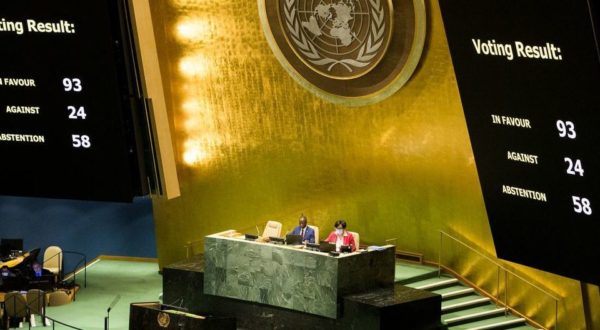
– On April 7, The United Nations suspended Russia from the Human Rights Council in response to the recent accusations of Russian troops killing civilians in Bucha. China voted against the motion, claiming it has forced countries to choose sides, which will aggravate the division among member states.
– On April 4, Chinese Foreign Minister Wang Yi assured Ukrainian Foreign minister Dmytro Kuleba that Beijing continues to support peace talks and aims to play a constructive role in resolving the Russia-Ukraine war.
– On April 1, the UK National Cyber Security Center accused the China government of conducting thousands of hacking attempts on over 600 websites. Ukrainian security officials denied any involvement in supplying information to the British report.
– On April 1, discussions on the Ukraine war dominated the first China-EU summit in almost two years. Both sides agreed to cooperate in principle on promoting peace, no firm commitment was provided by Beijing on using its influence on Russia to stop the assault.
– On March 29, Sinopec—China’s largest oil and gas refiner—terminated a half-billion-dollar set of investments in Russia’s largest petrochemical producers, Sibur and Novatek. Western sanctions over Russia’s invasion of Ukraine have also affected smaller Chinese companies that are more vulnerable to exchange rate losses.
Associated News Sources: “U.N. suspends Russia from Human Rights Council; China opposes”, Nikkei Asia, April 7 [Paywall] “As the world reacts in horror to Bucha, China’s state media strikes a different tone”, CNN, April 6 “Ukraine war: Beijing assures Kyiv that China supports peace talks”, South China Morning Post, April 5 [Paywall] “China accused of cyber-attacks on Ukraine before Russian invasion”, The Guardian, April 2 “EU-China summit: cooperation on Ukraine but Beijing won’t commit to pressing Russia”, South China Morning Post, April 2 [Paywall] “Chinese trade with Russia feels the sting of Ukraine war”, Reuters, April 1 [Paywall] “Sinopec pulls the plug on Russian oil projects”, SupChina, March 29
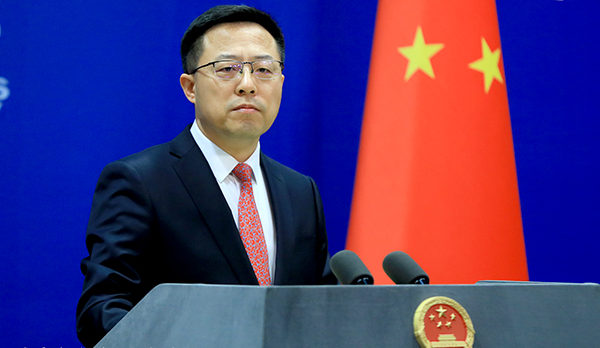
– On April 11, Chinese President Xi Jinping and Philippine President Rodrigo Duterte had an “open, warm, and positive” one-hour phone call and reportedly agreed to “broaden the space for positive engagements” on the South China Sea issue.
– On April 7, Chinese Foreign Ministry spokesperson Zhao Lijian warned of strong measures if House Speaker Nancy Pelosi visited Taiwan. He claimed that Beijing firmly opposed all forms of official interactions between the United States and Taiwan, and Washington should cancel the trip. The trip was later delayed after Pelosi tested positive for COVID.
– On April 6, Zhao Lijian accused the U.S., UK, and Australia of trying to build an “Asia-Pacific version of NATO” in response to announced plans to develop hypersonic weapons via the recently created AUKUS security alliance.
– At the third Meeting of Foreign Ministers of the Neighboring Countries of Afghanistan, China reaffirmed its partnership with Russia and intends to strengthen bilateral relations as Moscow faces international sanctions. Both foreign ministers noted the counterproductive nature of the illegal unilateral sanctions imposed on Russia “by the U.S. and its satellites”.
– On March 31, China held two international meetings in Tunxi to discuss the ongoing instability in Afghanistan with representatives from Kabul’s immediate neighbors and the ‘Extended Troika’ of the U.S., China, and Russia.
Associated News References: “Duterte, Xi Talk South China Sea in Virtual Summit”, The Diplomat, April 11 [Paywall] “Nancy Pelosi postpones Asia trip after testing positive for Covid-19”, CNN, April 8 “China warns U.S. against House Speaker Pelosi visiting Taiwan”, Reuters, April 7 [Paywall] “China accuses US, UK and Australia of trying to build Asia-Pacific NATO”, ABC News, April 6 “Amid Ukraine War, China Welcomes Russia’s Foreign Minister”, The Diplomat, March 31 [Paywall] “China holds multinational meetings to discuss Afghanistan”, Al Jazeera, March 31
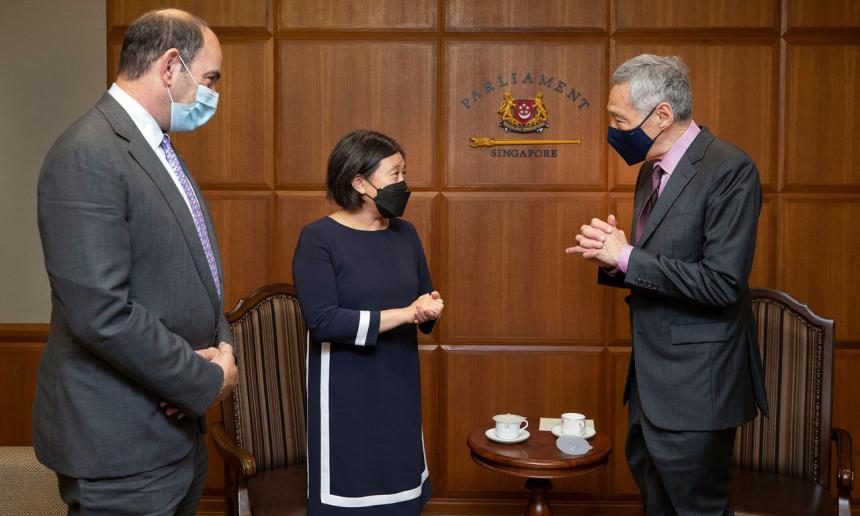
– On April 8, Pamela Phan—deputy assistant secretary for Asia at the Commerce Department—said that the much- anticipated Indo-Pacific Economic Framework could be launched “in the next month or so” at a conference hosted by the Center for Strategic and International Studies.
– On April 5, USTR Katherine Tai was met with strong support from Singapore’s Prime Minister Lee Hsien Loong after the pair spoke about IPEF.
– On April 2, Australian Trade Minister Dan Tehan and his Indian counterpart Piyush Goya signed the Australia- India Economic Cooperation and Trade Agreement, which aims to reduce economic dependence on China.
– China’s zero-tolerance approach to Covid-19 has greatly reduced output in its powerhouse manufacturing sector, as lockdowns hit factories ranging from Changchun in northeastern China to the southern technology hub of Shenzhen, including the financial capital Shanghai. U.S. companies operating in China warned about the possibility of necessary relocation.
Associated News References: “Biden’s Indo-Pacific Economic Framework is at a crossroads”, The Hill, April 8 “Singapore welcomes U.S. ‘high-ambition’ trade engagement in Asia”, Nikkei Asia, April 5 [Paywall] “Australia signs ‘groundbreaking’ trade deal with India to reduce dependence on China”, South China Morning Post, April 2 [Paywall] “U.S. companies warn over China’s COVID lockdown measures”, Nikkei Asia, April 1 [Paywall] “Covid-19 Outbreaks Slow Factory Activity in China”, The Wall Street Journal, March 31 [Paywall]
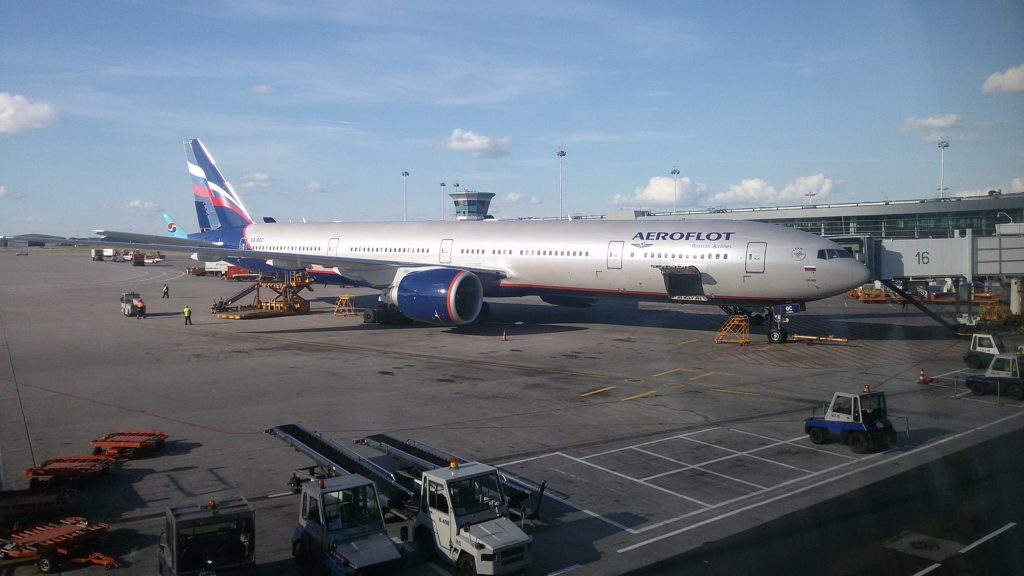
– On April 7, the U.S. Department of Commerce issued orders denying three Russian airlines that use U.S.-made planes from receiving services abroad—per U.S. export controls—naming China among their foreign destinations.
– On April 5, it was reported that several U.S.-listed Chinese companies have employed U.S.-based accounting firms as their principal auditors to comply with a 2021 law that forbids the trading of securities in companies whose audits cannot be inspected by American authorities.
– On April 2, the China Securities Regulatory Commission removed the stipulation that on-site inspection of offshore companies’ financial documents be conducted only by Chinese authorities, allowing U.S. regulators access to the audit reports of Chinese companies listed in New York.
– On March 30, SEC Chair Gary Gensler tempered expectations that negotiations to prevent the delisting of several Chinese stocks in the U.S. will be successful, saying that Chinese authorities may have to face “a hard set of choices” such as full compliance with U.S. audits.
Associated News References: “U.S. Takes First Enforcement Actions Against Alleged Violators of Russia Export Controls”, The Wall Street Journal, April 7 [Paywall] “Some Chinese Companies Find Workaround to Avoid U.S. Delisting”, The Wall Street Journal, April 5 [Paywall] “China Removes Key Hurdle to Allow U.S. Full Access to Audits”, Bloomberg, April 2 [Paywall] “SEC Chief Doubts Imminent Deal to Avoid China Delistings”, Bloomberg, March 30 [Paywall]
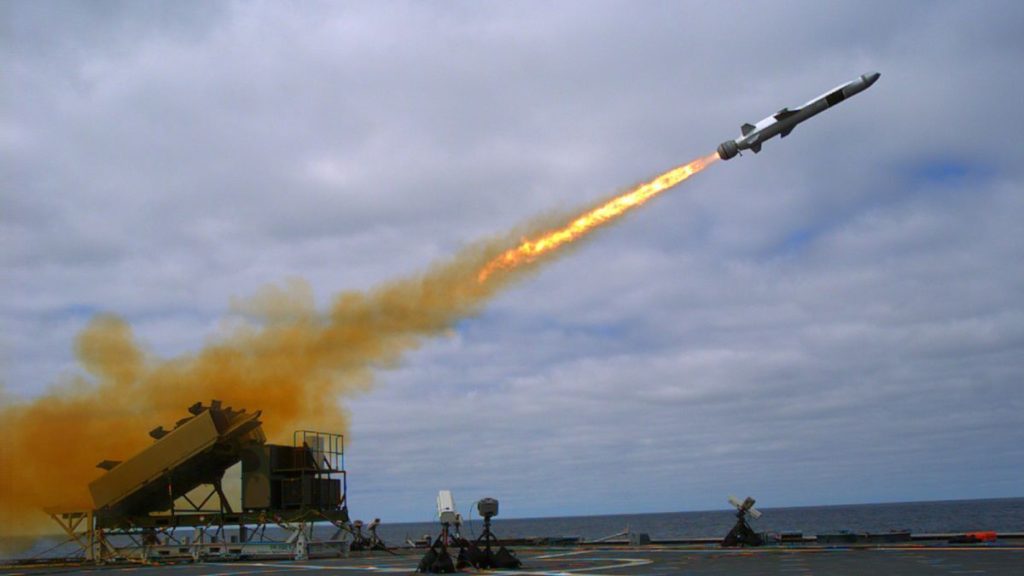
– On April 5, the British, American, and Australian leaders issued a joint statement adding hypersonic weapons and electronic warfare as areas of research & development cooperation under the AUKUS security pact.
– On April 3, Taiwan President Tsai Ing-wen told crowds gathered at a state-funded aerospace park that “it’s highly necessary for us to speed up our development of drones as it will be an important matter for the next generation.”
– On March 29, the Prime Minister of the Solomon Islands Manasseh Sogavare defended the country’s security deal with China, which could allow for a Chinese military presence in close proximity to U.S. and allied bases. The U.S. will respond by sending Kurt Campbell and Daniel Kritenbrink—the top NSC and State Department officials for the Indo-Pacific—to Honiara in the following month.
– On March 28, the Biden Administration submitted an $813 billion budget proposal for national defense in Fiscal Year 2023, which names China as the United States’ “most consequential strategic competitor.”
Associated News References: “Top US official Kurt Campbell reportedly heading to Solomon Islands to discuss Chinese security pact concerns”, Australian Broadcasting Corporation, April 9 “China’s security deal with Solomons raises alarm in Pacific”, AP News, April 7 “US, UK, Australia add hypersonic weapons to security pact”, Al Jazeera, April 5 “Taiwan looks to develop military drone fleet after drawing on lessons from Ukraine’s war with Russia”, South China Morning Post, April 3 [Paywall] “Solomon Islands leader defends possible China security deal, calls backlash ‘very insulting’”, CNN, March 29 “Biden administration proposes larger defense budget to counter China, Russia”, CNN, March 28 “$773B Pentagon Budget Request Places Emphasis on China; Russia Now Poses ‘Acute Threats’”, USNI News, March 28
“China Sets Aside Push to Spread Wealth in Pivotal Year for Xi”, The New York Times, April 12 [Paywall]
“Huawei suspends some Russian operations amid sanctions risks, reports say”, South China Morning Post, April 12 [Paywall]
“U.S. Orders Departure of Consulate Staff and Family From Shanghai Due to Covid-19 Surge”, The Wall Street Journal, April 12 [Paywall]
“Exclusive: Former Xinjiang prisoner arrives in U.S. as key witness to abuses”, Axios, April 12
“European Chamber urges China in letter to review COVID policy”, Reuters, April 11 [Paywall]
“Founder Ren Zhengfei urges Huawei to step up patent licensing”, South China Morning Post, April 11 [Paywall]
“Apple starts manufacturing iPhone 13 in India”, Reuters, April 11 [Paywall]
“University of Kansas professor convicted of concealing China ties”, Reuters, April 8 [Paywall]
“China’s Services Sector Posts Steepest Decline Since Pandemic’s Start”, The Wall Street Journal, April 6 [Paywall]
“Shanghai extends lockdown to entire city as tests show Covid spread”, NBC News, April 5
“‘It’s time to go home,’ Hong Kong leader Carrie Lam says as she reveals current term will be her last”, South China Morning Post, April 4 [Paywall]
“After a Boycott, Chinese Television Is Again Airing N.B.A. Games”, The New York Times, March 31 [Paywall]
“U.S. Charges Chinese Agent in Alleged Schemes to Forcibly Repatriate U.S., Canadian Residents”, The Wall Street Journal, March 30 [Paywall]
“Huawei still fighting for ‘survival’ as Meng Wanzhou returns to corporate stage”, CNN, March 28
April 12 hosted by Carnegie Endowment for International Peace

Middle Power Countries’ Perspective on U.S.-China Relations
Wednesday, April 20, 2022
10:00 AM – 11:30 AM EST
In collaboration with the University of Alberta’s China Institute and the Grandview Institution, ICAS is proud to co-host an upcoming roundtable event on how middle powers view contemporary U.S.-China relations. As the United States and China find themselves caught in a great power struggle, the rest of the world is left watching. Middle power countries–such as Australia, Canada, India, Japan, and South Korea–now find themselves embroiled in the toxic struggle between the U.S. and China for global prominence and power. These countries have been left to wage their own diplomatic battles as they try to balance decades–or even centuries–of historic relations with economic priorities, security initiatives, and their own national values; all while aiming to maintain global stability and foster their own national growth. While many of these countries find themselves in similar situations as a ‘middle power’ country, they also inevitably hold their own unique needs and desires–for both the state of U.S.-China relations and for the global stage as a whole–that cannot be ignored.
While it is important to understand China and America’s global visions from their respective perspectives, it is also important to assess this bilateral relationship from the perspectives of other global actors. In the globalized world that we live in today, third party countries, especially these middle power countries, are important partners for both China and the U.S. to engage and manage global challenges. The middle powers are essentially the “middle-class” members of the global society that uphold the status quo and stabilize the international system. Thus, hearing from the middle powers can provide fresh perspectives on the inevitable realities of the U.S.-China relationship. It also helps provide a bystander’s perspective for policymakers in Washington and Beijing to search for ‘guardrails’ in their increasingly competitive relationship.
This event will bring together scholars representing five aforementioned middle power countries to present and discuss their countries’ perspectives on the increasingly competitive U.S.-China relationship to ultimately build a better understanding of middle power countries’ unique and important perceptions of–and role within–the U.S.-China relationship.
On Tuesday, March 29, 2022, Senior Fellow Sourabh Gupta was quoted by Press TV on the impact of the Russia-Ukraine conflict on China’s global relations.
On Tuesday, March 22, 2022, Research Associate & Program Officer Matt Geraci was featured in The World on Chinese fears of a ‘Pacific NATO’.
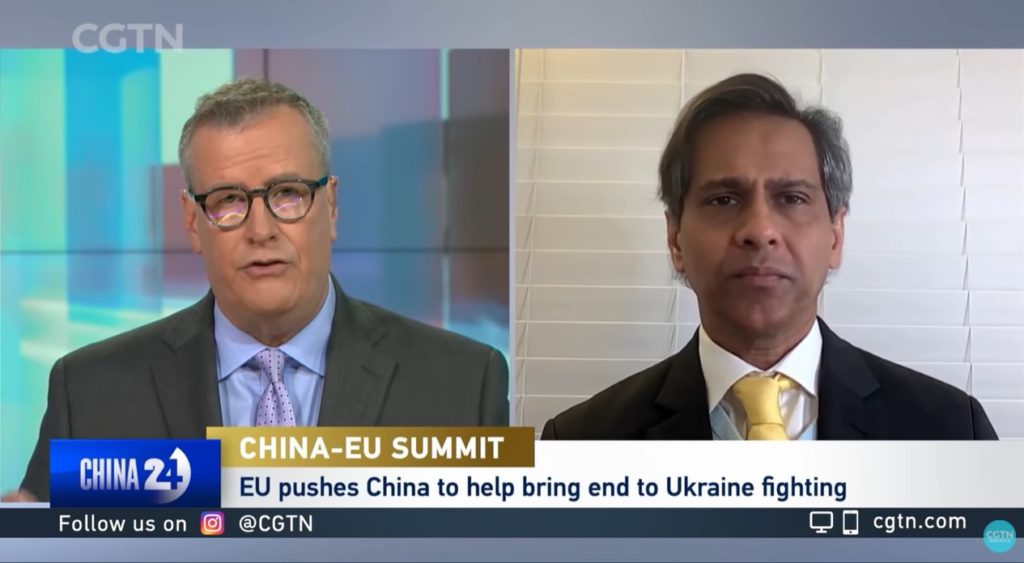
On Saturday, April 2, 2022, Senior Fellow Sourabh Gupta discussed the EU-China Summit on CGTN America.

The Institute for China-America Studies is an independent nonprofit, nonpartisan research organization dedicated to strengthening the understanding of U.S.-China relations through expert analysis and practical policy solutions.
1919 M St. NW Suite 310,
Washington, DC 20036
icas@chinaus-icas.org
(202) 968-0595
© 2024 INSTITUTE FOR CHINA-AMERICA STUDIES. ALL RIGHTS RESERVED.